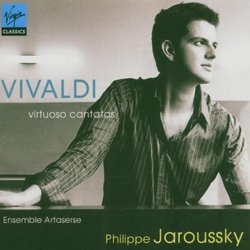| All Artists: Antonio Vivaldi, Ensemble Artaserse, Philippe Jaroussky, Jeremie Papasergio, Emilia Gliozzi, Claire Antonini, Yoko Nakamura Title: Philippe Jaroussky - Vivaldi virtuoso cantatas Members Wishing: 0 Total Copies: 0 Label: Virgin Classics Release Date: 4/12/2005 Genres: Pop, Classical Styles: Vocal Pop, Opera & Classical Vocal, Chamber Music, Historical Periods, Baroque (c.1600-1750), Instruments, Strings Number of Discs: 1 SwapaCD Credits: 1 UPC: 724354572128 |
Search - Antonio Vivaldi, Ensemble Artaserse, Philippe Jaroussky :: Philippe Jaroussky - Vivaldi virtuoso cantatas
 | Antonio Vivaldi, Ensemble Artaserse, Philippe Jaroussky Philippe Jaroussky - Vivaldi virtuoso cantatas Genres: Pop, Classical
|
Larger Image |
CD DetailsSimilar CDs |
CD ReviewsAnother Fine Countertenor Lights Up The World! Grady Harp | Los Angeles, CA United States | 04/12/2005 (5 out of 5 stars) "This exciting recording of Vivaldi cantatas for solo voice and instrumental ensemble is one of the more compelling releases of the year to date! While the music of the glorious Venetian Antonio Vivaldi is well known, especially the standard repertoire `The Four Seasons' and the choral works and chamber works - even some operas - the cantatas are rarely performed and this CD of his best ones should change that. Philippe Jaroussky is yet another fine countertenor who is rather recent on the scene. With the growing popularity of musicians courageous and gifted enough to become successful in the countertenor repertoire (just pause for a moment and think of the significant number a star quality countertenors on the stages today), the numerous pieces for this range of voice continue to appear. Vivaldi's cantatas are refined, beautifully embellished, demanding consummate artistry of not only the high hurdles for the voice but also for the accompanying forces. Jaroussky seems to have endless breath, singing the long extended lines with total ease. His embellishments alter with each da capo as to the period born! This is a voice a great power and warmth and one that feels married to the texts. Providing brilliant collaboration is the Ensemble Artaserse and period instruments. The variety of color is awe-inspiring and the technique of these unique musicians is impeccable. In their solo portions they produce a richly elegant - yes, Venetian sound. And in tandem with Jaroussky the complete effect is one of single purpose, line, and harmony. This is a new CD to treasure and the sampling is generous. For this reviewer this is a new repertoire to explore and it would be difficult to imagine forces better suited to these treasures than those on this CD. Highly recommended. Grady Harp, April 05 " A voice teacher and early music fan George Peabody | Planet Earth | 05/20/2006 (5 out of 5 stars) "PHILIPPE YOU ARE MAGNIFIQUE!!! Philippe Jaroussky is probably the most prominent French sopranist that has emerged at the turn of the 21st century era. He has mainly focused on early music showing a peference for the works of Monteverdi, Vivaldi, Handel and several lesser-known 17th and 18th century composers. He records extensively with his own instrumental ensemble "Artaserse", as well as with the leading conductors associated with early and Baroque music, such as Rene Jacobs. His earliest recording was in 1999 where he sang in the oratorio "Sedecia, re di Gerusalemme" under the direction of Gerard Lesne, countertenor, who also sang in the oratorio. This was my first exposure to Jarrousky; he was MAGNIFICENT!!!If you do not own this recording and you like his voice, it is still available. Please check out my customer review if interested. The vocal selections on this disc, in addition to the five cantatas represented, include 2 arias from Vivaldi operas. However, at that time the cantatas and the operas were very closely aligned using the same instrumentation and truthfully it would be difficult to tell the difference between them had I not been previously informed. Jaroussky has excellent vocal technique;in fact in some passages he astounds the listener. His aria: 'Cor ingrato dispietato' (from an opera) displays amazing breath control and clean clear notes. If there is something lacking it is in slow passages that demand more intensity and emotion; age and experience will certainly help!!!And his voice sounds better when the music has a high tessitura. He's a fresh new voice in the world of countertenors. My appreciation knows no bounds for the "Ensemble Artaserse";they are truly excellent and skilled on their instruments; wonderful to hear. This is really a great disc!!!! The accompanying booklet includes pertinent information and the text(Italian) all in French, German and English. " Great ensemble singing Anton Zimmerling | Moscow, Russia | 10/02/2008 (5 out of 5 stars) "The most outstanding feature of this excellent CD is a very high quality of ensemble singing. Ensemble Artaserse is a wonderful group including two virtuoso players -Jeremie Papasergio (baroque bassoon)and Emilia Gliozzi (cello). They match excellently with the stellar French countertenor Philippe Jaroussky, whose timbre is in fact instrumental, too. Although Jaroussky is certainly the star of this recording, I cannot say that other musicians are just accompanying him - they are making music together. If I were to choose the best track, my choice would be the aria 'Di verdi ulive' from Tito Manlio (track 21); here the vocal line beatifully intertwines with an obligato cello part played by Gliozzi. I am happy to have cello sonata RV 47 with Gliozzi on this CD: it is fine music, especially the last two movements.
The main core on this CD are five solo cantatas by Vivaldi. I think that the best of them are Alla caccia dell'almi e de'cori RV 670 and Qual per ignoto calle RV 677, then comes Perfidissimo cor RV 674. I am less taken by Care selve, amici prati RV 671. The last item, Pianti, sospiri e dimandar mercede RV 676 sounds banal to my ears, though it of course gives many chances to the soloist to show up his virtuosity. The singing type 'countertenor' which seemed clear in the day of Alfred Deller and James Bowman has gradually become vague, since present day singers, who sing with a head voice have very different timbres and sing in different registers. David Daniels, for instance, often sounds as a male contralto. Philippe Jaroussky is a male soprano: his forte are melismas and coloratura in the high register - he gets it without any effort. Of course, he has many other merits. He is young, has a fresh voice, long breath and impeccable musicality - he hits the very center of each note: in this respect he reminds me of young Alfred Deller, though Jaroussky's voice, unlike Deller's is is not warm. His vocal style and instrumental timbre devoid of romantic vibrato suit perfectly to the music on this CD." |

 Track Listings (25) - Disc #1
Track Listings (25) - Disc #1